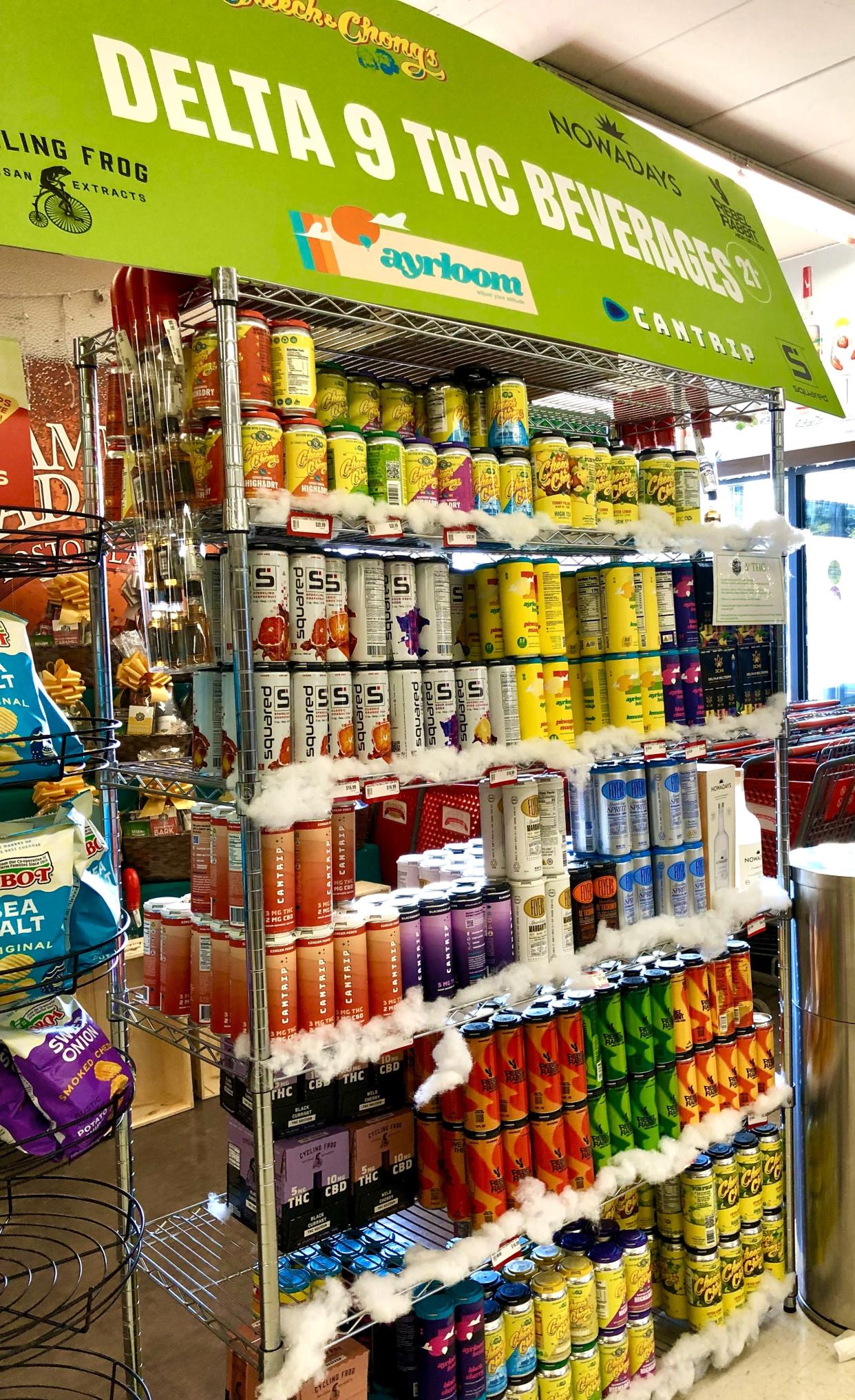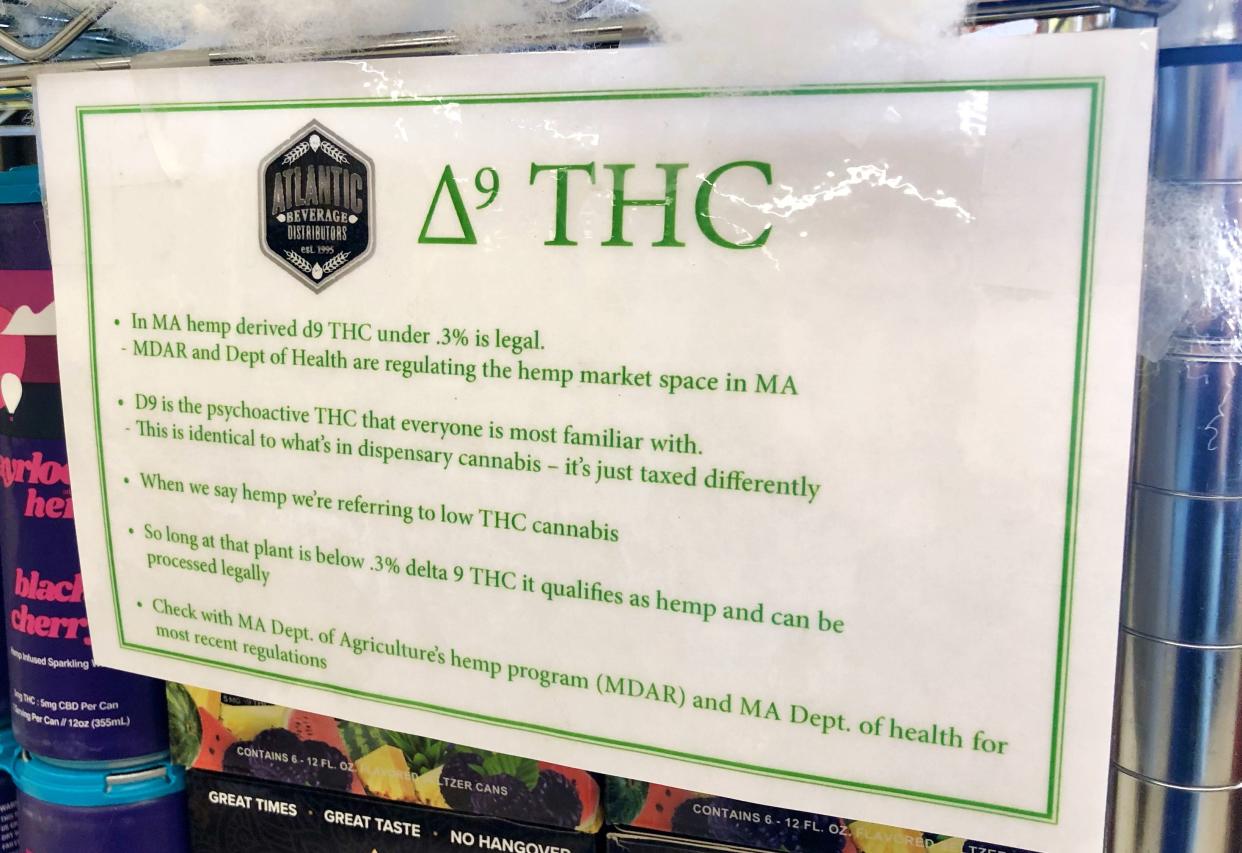Beer, wine and THC? THC drinks pervade liquor stores despite lack of state oversight

At the neighborhood package store, anything new leaps off the shelves: the bottle of bourbon or estate California cabernet; a four-pack of ultra-rare IPA.
Seltzers dosed with 5 milligrams of THC.
Since last year, liquor stores in Massachusetts have filled more of their shelves with beverages containing hemp-derived delta-9 tetrahydrocannabinol and CBD, expanding their portfolio to beer, wine, spirits and THC.
The competition in the industry has prompted retailers to sell the alcohol-free seltzers, sodas and cocktails despite zero guidance from federal, state or local officials on how to regulate them.
Basically, everyone thinks the drinks are legal, but nobody knows for sure.
Unlike THC edibles sold at licensed cannabis dispensaries, the products ship sans any independent scrutiny or testing. The claims made as to their potency or method for extracting the THC aren’t vetted.
Hemp and marijuana fall into the same plant species, but the latter carries a larger amount of delta-9 THC, the intoxicating component in cannabis. The 2018 Farm Bill legalized hemp at the federal level, saying it must contain less than 0.3% delta-9 THC on a dry-weight basis; a product could qualify as hemp yet still have 30 milligrams of THC, a formidable dose.
More: How high is Worcester? Legal cannabis is a big 'hit,' but challenges remain
More: How high is Worcester? Cannabis businesses find 'growing pains,' opportunity
The bill indirectly led to a surge of beverages with THC that regardless of license or age, anybody can sell and anybody can buy.
Some of the companies behind these beverages recommend selling them to customers aged 18 or older. Some say no one under 21 should purchase. In reality, no legal age-limit exists, unlike the heavily-regulated THC edibles sold at marijuana dispensaries.
The beverages come with tips for how to drink safely and warnings not to drive a vehicle or operate heavy machinery while consuming.
“This issue has been keeping me up at night,” said Robert Mellion, executive director of the Massachusetts Package Store Association. “We’re very concerned.”
Looking for answers
Last year, seeking clarity for the nearly 800 independent alcohol retailers he represents, Mellion began asking state agencies about the hemp-derived THC products, beginning with the Alcoholic Beverages Control Commission (ABCC).
The beverages don’t contain alcohol, so the ABCC, while they preside over the critical aspects of a liquor store’s business, told him it has no jurisdiction.
Mellion then turned to the Cannabis Control Commission (CCC), which told him it, too, doesn\'t oversee hemp.
A call to the state Department of Public Health came next. DPH told him to call the state Department of Agriculture (MDAR).
“MDAR looks to be potentially upholding jurisdiction on Delta 9 THC products,” Mellion said, “but we have yet to be provided any guidance on whether these products are legal to sell in Massachusetts retail stores.”
MDAR doesn’t list beverages on its website under hemp products that can be wholesaled. Under products that cannot be wholesaled, it lists any food containing CBD.
As for retailers, the MDAR notes it “does not regulate the retail market.”

A hazy definition
Mellion wonders why the hemp-derived delta-9 THC and CBD beverages aren't considered food. And he questions the Farm Bill’s legal definition of hemp in terms of liquids.
“In review of the federal Farm Bill, one could easily argue that the language explicitly excludes liquid, water, oil, gelatin, or other non-dry substances used in the finished product,” Mellion said. “This exclusion of explicit language pertaining to liquids does not bode well for moisture-heavy products like tinctures and beverages.”
The companies churning out the delta-9 THC products are certain their products qualify as federally legal, given the Farm Bill legalized hemp-derived delta-9 THC. They also say, based on the weight of the liquid in the cans, the beverages contain less than 0.3% THC, making them legally hemp.
Minnesota last year became the only state in the country to pass a law that covers both marijuana and hemp. As it concerns hemp-derived THC, Minnesota’s law lists requirements for age (21), product labels and testing (must undergo independent testing). And any business that sells hemp-derived THC has to first register with the state.
The sole Total Wine & More location in the country that sells hemp-derived THC beverages is in Minnesota. Clearly the massive liquor store chain has chosen caution, avoiding selling the products in states where their legal standing remains fuzzy, such as Massachusetts.
Here, Mellion has cautioned MassPack’s membership not to assume hemp-derived THC beverages are legal.
“We’re not saying these are safe products to sell,” he said. “You’re selling these products at your own risk.”It’s a risk some stores are willing to take, he said, given the pressure to compete in the market.
“They’re pushed by wholesalers,” he added. “They’re being told, ‘If you don’t sell it, the guy across the street will be selling it.’”
Distributors in the dark
Like MassPack, the Beer Distributors of Massachusetts Inc., the trade association that advocates on behalf of wholesalers, won’t draw up anything official on how to market and sell hemp-derived THC until it receives guidance from the state or federal government.
“Until we get that, we’re somewhat searching in the dark and are faced with a decision as to whether or not you want risk the enterprise value of your long-established business for the sake of this new product that may or may not have a host of regulatory problems associated with it,” said the president, Bill Kelley.
The confusion has led some distributors, such as Auburn’s Atlas Distributing Inc., opting to wait on specific regulations before adding any of the products into their lineup.
More: Beaver Pond Distillery mastering ‘water of life’ in Petersham
More: From Worcester to Murder Hill: Wormtown brewmaster unveils new taproom-brewery
Still others have dove in, including Atlantic Beverage Distributors in Holliston, whose website lists over a dozen hemp-derived delta-9 brands that it distributes.
Kelley told me wholesalers want to protect their retail customers, acknowledging they face more of a risk from selling the unregulated products. Given the absence of an age-requirement, the stores could see a host of problems if the beverages get into the hands of someone too young to use them responsibly or mindfully.
“You have a product that promotes and markets itself as delivering the same THC punch as cannabis obtained through the licensed dispensary system,” he said.
The cannabis bandwagon
For liquor stores to sell hemp-derived THC beverages, they need only order a few cases from a distributor, price the packages and stock them anywhere they see fit.
On the other hand, a cannabis company must sell “consumer-ready” hemp products from hemp processors licensed by the MDAR. The dispensary needs to maintain a dedicated section in its store for hemp products, strictly enforce an age restriction of 21 or older, maintain a record of sales and consult with the state Department of Revenue on how they should tax them.
And each product must come with an 83-word warning, including: “It is not regulated by the Massachusetts Cannabis Control Commission and the product may not be consistent with the requirements of” state cannabis laws.
It’s unfair that dispensaries have several more hoops to jump through when it comes to hemp products. However, Jen Ngo, chief of staff for Bud’s Goods, which runs three dispensaries in the state, told me the problem to her isn’t one of fairness but of safety and ethicality.
“It’s shocking to me,” Ngo said of package stores promoting the delta-9 drinks. “That’s them trying to hop on the cannabis bandwagon. I don’t think cannabis is taking away from alcohol sales at all. They work side by side. For a liquor store to be regulated and not care about a product that is also technically under regulation, I also think that’s extremely negligent. They just care about making a buck not the safety of the consumer.”
This article originally appeared on Telegram & Gazette: Beyond Beer: Despite lack of state oversight THC beverages abound






